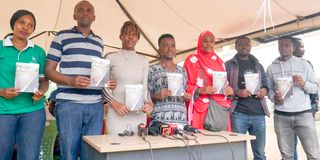Report claims Kware search ended too soon, more bodies still in the pit

Co-chair of Mukuru Community Justice Centre Anami Daudi Toure (second from right) and other community members pose with their report on the aftermath of the Kware murders, on November 13, 2024 at the centre in Nairobi.
What you need to know:
- Members of Mukuru community retrieved bags containing human body parts from Kware dumpsite last July, but now feel abandoned by institutions that initially showed interest.
- A new report by Mukuru Community Justice Centre criticises the government's inadequate response, highlighting how volunteers handled body retrieval without proper support.
- The suspected serial killer remains at large after escaping custody.
In July, members of the Mukuru community retrieved bags containing human body parts from the Kware dumpsite pit in the Mukuru Kwa Njenga informal settlement, working without adequate protective gear.
Four months later, many grassroots organisations feel abandoned by the numerous institutions that initially flocked to cover the gruesome story of murdered women dumped in a quarry. They're calling on the government to take more action.
"The community has not moved on, but the government has moved on," said Anami Daudi Toure, co-chair of the Mukuru Community Justice Centre, a local grassroots organisation.
On Wednesday, the centre released a report detailing their response to the Kware murders: from organising volunteers to retrieve bodies from the pool of raw sewage to supporting victims' families.
The report critiques the actions of the government, police, international human rights groups, and the media, depicting a community that feels abandoned to handle the aftermath alone.
The official response, they maintain, has been inadequate.
"The suspect needs to be arrested again, the case needs to be taken to court and we also need to know who all other bodies that were retrieved from Kware are – we need to know their stories," said Toure.
Only six women have been positively identified from the numerous remains retrieved from the pit: Roseline Akoth, Josephine Mulongo, Christine Mwende, Wilkister Ososo, Brenda Shatuma, and Imelda Karenya.
Community members believe more bodies remain undiscovered and that the retrieval process ended too soon.
The report highlights the state's failure to identify all victims through its biometric database.
"This might explain why at the City Mortuary, there are a lot of unidentified bodies," said Mukuru community activist Geoffrey Mboya during Wednesday's press conference.
The group also raised concerns about how youth volunteers from Mukuru bore the bulk of the body retrieval work with minimal support or resources.
The Director of Criminal Investigations' (DCI) forensic team "was watching us waiting for the bodies to be retrieved instead of helping us," the report states. The group also criticised the county government, which "did not show up with the necessary equipment during the retrieval process."
Unanswered questions, suspect on the run
"There was a lack of coordination between the security sector, the DCI, the police and also the county government," said Toure, who advocates for a review of Kenya's disaster management system.
"People from poor communities are exposed to a lot of disasters, but how is the government prepared in terms of responding to these disasters?" Toure wondered. "At Kware, there was not any response."
Police arrested 33-year-old Collins Jumaisi in July, who allegedly confessed to killing 42 women since 2022, including his wife. Jumaisi's lawyer claims the confession was made under duress.
In August, Jumaisi escaped from Gigiri Police Station in Nairobi along with 12 others, raising questions about police misconduct. Several officers suspected of aiding the escape were later arrested.
Jumaisi remains at large.
"There is no way that a suspect accused of committing such [a] heinous act can just disappear from a police station in Gigiri," said Fredrick Ojiro, a rapid response officer with human rights organisation Haki Africa.
"Not in Kibra Police Station, but in Gigiri," he emphasised, noting the contrast between Gigiri, one of Nairobi's most affluent neighbourhoods and home to the United Nations offices, and the informal settlement of Kibra.
"The report has clearly indicated that this community is traumatised and is still demanding answers from the state," said Ojiro, adding that volunteers who waded into the dump still believe more bodies remain inside.
Toure noted that conditions at the dump site, a vast pool of water contaminated with medical waste and trash, make it impossible to be certain whether more victims lie hidden within.
Do you know why people say there are still more bodies, he asks, "It's because the government didn't do enough to ensure people are satisfied... the retrieval process was stopped."
Peter Gacheru Waweru, 28, was among the volunteers who waded into the quarry to retrieve bodies.
"The experience has affected me psychologically," said Waweru, who spent nearly a month searching for bodies and retrieved the remains of some identified women.
"The families came and told me 'thank you'," said Waweru, his eyes tearing up.
Toure wants more mental health support for volunteers like Waweru.
"You know, this matter has been left to us alone, so we're still appealing for help," said Toure. The centre is currently fundraising for psychosocial support for first responders.





